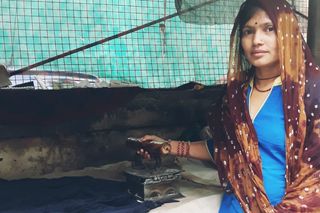
Peripheral Vision: a Laundress
“The job is nice but monotonous. And tiring. My lower back hurts from standing all day.”

Our series, Peripheral Vision, explores the untold stories of people we encounter on a daily basis.
My name is Geeta Devi, and I’m 35 years old. I came from Raebareli in Uttar Pradesh two months ago with my brother. He’s been in Mumbai for more than a decade, making a living from ironing and washing clothes.
The last time he visited home, he said he could do with an extra pair of hands to help him out, and I offered to tag along. My husband was any way in Mumbai, driving a rickshaw. And back home, I wouldn’t do much apart from carrying out household chores, working on the farm, and helping my in-laws. When my brother proposed the idea, I said yes, thinking I’d get to see actors every day. That was my only motivation to agree to come here. And then I asked myself: how difficult would ironing clothes be anyway? I’m used to it because I do it for everyone back home.
But in two months only, I’ve realized how difficult it is to take the responsibility of washing and ironing someone else’s clothes. I have to be careful of the color, embroidery, delicate work on it, and the material. Everyone gives me different kinds of instructions — wash with cold water or lukewarm water; don’t dry under the direct sunlight; or don’t wring it too hard; use steam while ironing or don’t steam while ironing — it’s difficult to remember so many instructions. I’ve not even seen so many varieties of clothes to know what needs what kind of washing and ironing.
When I’d just started work, I used to write down every instruction that came with every piece of cloth. Then it started getting very tedious. I thought I’ll be able to remember what needs to be done — but I messed up. A client had given their silk sari to get it ironed and had instructed me to use a towel under the iron, and not place the iron directly on the sari. In the flow of things, I forgot about it and placed the hot coal iron on the sari. It got stuck and ended up making a large hole. I panicked and told my brother about it — obviously, he got furious, but he also understood that I couldn’t have known that it would end up burning the sari. He suggested that we confront the client directly, maybe that would keep her calm. But we were wrong. Quite understandably, she was angry and wanted us to pay the amount the sari had cost her. We told her we’d never be able to pay up, and after a lot of convincing, she let us go without a fine. But we lost her as a client.
That day has been a great lesson, and fortunately, I’ve never gotten into trouble again except for little things like clothes getting swapped or getting left out in the shop before delivery. But thanks to my brother, who keeps encouraging me and tells me it’ll keep getting better with time, I’ve not felt demotivated so far.
Related on The Swaddle:
Peripheral Vision: a Bar Housekeeper
I work 12 hours a day; we open the shop at 8 a.m. after my brother collects clothes from houses nearby, while I get the coal ready, and set everything else up. There’s a chai wala and vada pav wala right next to our shop, so we often end up eating breakfast from there, and that is enough to keep us going until noon. I’ve never counted, but I think together, we end up ironing at least 300 to 400 clothes a day. It is quite tiring to stand all day and hold that heavy iron. Initially, I never realized how the amount of standing would end up taking a toll, but now I do feel the pain in my lower back. I don’t know how my brother has done it for so many years.
Since this is a makeshift space, it’s fine to carry out all the ironing when it’s not raining. But when it does rain, he’s told me, sometimes the water seeps in from the ceiling or the sides, and there are chances that the clothes will get dirty or wet, so we need to be extra careful. Also at times, since the shop is such a small space, we have to ensure that the clothes are dry even if it means half of your body is outside and getting wet. I’m not looking forward to the rains for these reasons, although I was very excited because I’ve heard how beautiful it gets when it rains in the city.
We don’t take any day off. In fact, on weekends, we get a lot more business because people wash all the piled up laundry, or get a chance to get their furnishings — curtains, sofa covers — cleaned and ironed. For these, we charge a little more, which means we can’t let go of the business, and hence, we get no weekends off. The only time I get off is an hour-long lunch break and when we pack up at night and leave for home. Then it’s television time but on most days, we’re so tired that we sleep without dinner.
The job is nice but monotonous. And tiring. For now, I’m only helping my brother out, but I do wish to make money, too. I have everything I need; nobody denies me anything — but I want to be financially independent, too.
This interview has been condensed and edited for clarity. As told to Anubhuti Matta.
Anubhuti Matta is an associate editor with The Swaddle. When not at work, she's busy pursuing kathak, reading books on and by women in the Middle East or making dresses out of Indian prints.
Related


Why We Enjoy Revenge Stories Much More Than Stories About Forgiveness
